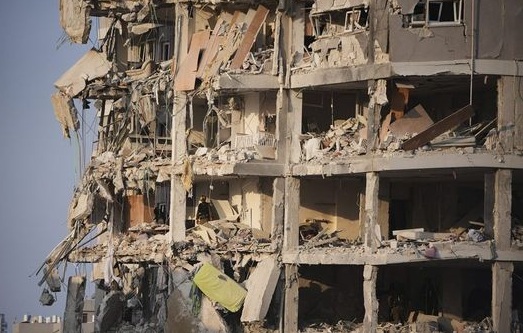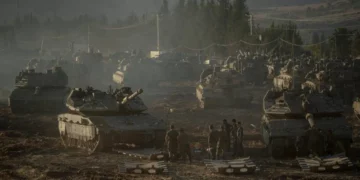A woman with a fashionable haircut, with the lower half of her head shaven, is holding her baby, while her husband negotiates a price with taxi drivers. There’s another family of three with a little boy travelling back to their country of residence, Austria.
It’s hot, dusty and feels like a desert at the Agarak border crossing between Armenia and Iran.
There are dry, rocky mountains surrounding the area – no trees, no shade. It’s not the most welcoming terrain, especially for those who have travelled long hours to reach Armenia.
Most of those crossing into Armenia appeared to have residency or citizenship in other countries. Many were leaving because of the conflict between Israel and Iran, now in its eighth day, according to the BBC.
“Today I saw one site where the bombing happened,” said a father standing with a small child near the minivan that they just hired. They had travelled from the north-western town of Tabriz.
“All the people are scared, every place is dangerous, it’s not normal,” he added.
The conflict began on 13 June, when Israel attacked nuclear and military sites as well as some populated areas.
The Human Rights Activists News Agency (HRANA) – a Washington-based human rights organisation that has long tracked Iran – says 657 people have so far been killed. Iran has retaliated with missile attacks on Israel, killing at least 24 people.
Israel says it has established air superiority over Tehran and has told people to leave some of its districts. In recent days, heavy traffic jams have formed on roads out of the city as some of its 10 million residents seek safety elsewhere.
Those who drove to Armenia from Tehran said the journey had taken at least 12 hours. Several told us that they did not see the Israeli strikes – but heard the sound of explosions they caused.
“It was troubling there. Every night, attacks from Israel. I just escaped from there by very hard way. There were no flights, not any other ways come from there,” said a young Afghan man with a single suitcase, who did not want to be named.
He described the situation in Tehran as “very bad”.
“People who have somewhere to go, they are leaving. Every night is like attacking, people cannot sleep, because of the sounds of explosions, the situation is not good at all,” he said.
A young woman with white headscarf and thick fake lashes said she was heading back to her country of residence, Australia.
“I saw something that is very hard, I don’t want to talk about it,” she said as she boarded a car with several others for the onward journey to the Armenian capital Yerevan. Someone comes and attacks your country, would you feel normal?”
Some Israeli ministers have talked up the possibility that the conflict could lead to regime collapse in Iran.





